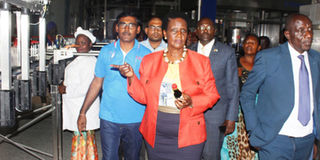Prime
11 companies yet to comply with ban on sachet alcohol

Ms Kyambadde (C) tours a section of Premier Distilleries before commissioning its new production line that will manufacture alcohol in bottles. PHOTO BY ISMAIL MUSA LADU
Kampala- Fifteen out of 26 alcohol producing companies have complied with the government instituted ban on production of alcohol in sachets.
Speaking during an engagement between the East Africa Breweries board and business leaders in Kajjansi last week, Trade Minister Amelia Kyambadde, said 15 companies had complied with the March 31 alcohol sachet ban.
“So far 15 companies have complied, others have not but we are going to deal with them with an iron hand,” she said, adding that a total of about 26 companies are registered in Uganda under the Alcohol Manufacturers Association.
Government issued a directive in 2017 banning the packaging and selling of alcohol in sachets, especially that of 200mls, saying they must be packed in plastic or glass bottles.
However, Ms Kyambadde said some companies are yet to install machinery that produces glass bottles.
“Others have not introduced machinery, but we are telling them, you should not produce because this is a government ban,” she said, noting some have gone underground to continue with production of sachet alcohol.
Ms Kyambadde threatened punitive action of either closing the business or withdrawing the license of any manufacturer found in violation of the ban.
However, store owners based on the outcry that they had purchased in bulk, asked for an extension of the ban to sell the sachets, which the minister responded to by pushing the deadline to May 31. “They appealed to us and told us they had taken credit in buying some of these products on wholesale basis and still had them in their stocks, so we gave them two more months to sell out which is upto May,” she said.
Essentially, no alcohol in sachets is expected on shelves after June 1.
Effect of taxes
However, during the discussions, it was noted that about 50 per cent of alcohol in Africa is illicit due to high taxation.
Mr Robert Nsibirwa, the second deputy Buganda Kingdom Katikkiro, said they had partnered with Uganda Breweries to produce low cost beer - Ngule.
However, he noted, the partnership had been affected by the Excise Duty imposed on the beer, urging government to reconsider its move.
In February, Mr Mark Ocitti, the UBL managing director, said tax collections from its low cost beer family including Ngule and Senator had dropped by Shs9b to declining sales.
Declining sales
Government introduced Excise Duty amendments this financial year that saw Ngule and Senator attract a Shs200 tax levy. This forced prices of the respective beers to increase to Shs2,200 from Shs2,000. The tax levy culminated into a decline of sales volumes by 30 per cent, which in turn affected tax remittances and payments to farmers.




